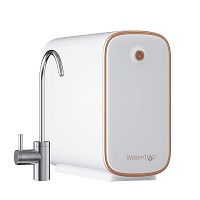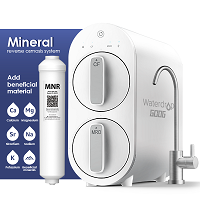Food provides energy. The energy and nutrients from food support our bodies. Yet, though water is calorie-free and tasteless, you could not live without water. People may have different diets and preferences about food, but the need for water is usually the same.
How Does Water Work in Your Body?
Water promotes countless physiological processes, including digestion, waste removal, and protection. The role that water plays in your body may be difficult to observe because it is always present everywhere. Let’s break down the role by how healthy supplementation of water keeps the body functioning normally.
The mouth is the first stop of the digestive tract, as well as the first stop of the action of water in your body. This first action starts with saliva. Saliva is delivered into the mouth by the salivary glands, but the main component of saliva is water. Saliva can break down food into smaller pieces and start the digesting process.
Water is a good solvent, which means that substances (especially food and its nutrients) are easier to dissolve and decompose in water. Therefore, water is a necessary part of digestion. When you are having meals, drinking water will help digest quickly and efficiently.
When the water gets mixed with the food you eat, it will continue to pass through your stomach and move towards the small intestine, where most of the water you drink is absorbed. The inner surface of the small intestine is covered with tiny finger-like protrusions called villi. These protrusions increase the surface area of the small intestine and maximize water absorption.
The water absorbed by the small intestine enters the blood and is transported throughout the body. Therefore, drinking plenty of water can help maintain healthy blood circulation.
Sometimes body waste accumulates in the blood and needs to be discharged, which takes our normal hydration journey to the next step: the kidneys.
The kidneys filter waste and toxins in the blood and remove undesired substances from the body through urine. This explains why it is so important to maintain healthy body hydration, especially when you feel uncomfortable.
Another way to remove the toxins is through excrement. Drinking water can also help relieve constipation. Water can soften the stool and help push the stool through the colon.
The skin is the last stop for water movements in your body as sweating is another water-based body function. Sweat is composed of water, minerals, electrolytes, and various compounds that your body wants to eliminate. Replenishing water provides your body with plenty of fluids to expel waste.
How Much Water Should I Drink?
In order to help your body function better and improve overall health, you should drink an adequate amount of water. According to nutritionists and health experts, the recommended general water intake is about 11.5 cups (2.7 liters) a day for women and 15.5 cups (3.7 liters) a day for men.
Instead of drinking a huge amount of water at one time, you should spread the total water intake amount throughout the day. Some recommended time slots include after waking up, before a meal, after a meal, work out time, and before going to bed. Read more about the water drinking tips here.
Health Benefits of Drinking Enough Water
Now we’ve learned how water is functioning in our bodies, what are some health benefits of drinking water?
Maintain The Balance of Body Fluids
Drinking water can help maintain the balance of body fluids. As we all know, our bodies contain over 60% of water by weight. Drinking enough water and replenishing the body fluids will prevent us from being dehydrated and other body system functioning issues.
Regulate Body Temperature
Drinking water can help regulate body temperature through sweating. When water passes through the skin pores, the accumulated moisture on your skin will leave your body. When water evaporates (changes from liquid to gas), it cools down. This is because sweating requires energy (in this case body heat) to convert liquid water into a gaseous state, which is water vapor. This process makes you feel comfortable and cool.
May Help Treat Kidney Stones
As we’ve discussed above, water plays an important role in removing body wastes and toxins. Kidneys, as the main detoxification organ, need water to function properly to filter and eliminate waste and toxins. The lack of water may lead to waste accumulation and eventually cause kidney problems like kidney stones.
Help Lose Weight
There are numerous studies showing that drinking water can help weight control. Water can help boost metabolism and burn more calories. Click here to learn more about how water can help you lose weight.
Which Water Is Best for You?
After learning so much about water, you may have a question about what type of water is best for you to drink? The recommended types of water are filtered water, bottled water, and mineral water.
Filtered Water
As the name suggests, filtered water is water that has been filtered through water filtration systems. Compared with tap water and well water, filtered water is free from impurities and is safer to drink. With news of water crisis being reported occasionally in recent years, filtered water is a safe and secure option.
In the old days, filtered water is not very accessible and usually being produced through large water treatment plants. While the fast development in the water filtration industry has made filtered water accessible to every household. Depending on your water needs, the home use water filtration systems ranging from countertop to undersink.
The Waterdrop D4 reverse osmosis system is one of the best undersink reverse osmosis water filtration systems you can find on the market. It adopts the latest reverse osmosis technology with composite filters and integrated system design. The system is compact and super easy to install. The 0.0001-micron filtration accuracy empowers you to drink clean water without concerning about water contamination. It is a very ideal model for a medium-sized family.
Bottled Water
Bottled water is another safe card in terms of accessing clean water. Many people choose to drink bottled water for its great taste, especially compared with tap water that contains trace amounts of chlorine. Yet, drinking bottled water is not the ultimate solution from both economic and environmental standpoints.
Mineral Water
Mineral water is a great water source. A certain amount of minerals like calcium and magnesium are beneficial to human bodies. Numerous studies have shown that drinking mineral water can help strengthen bones, improve heart and digestive health. The calcium and magnesium in water can help lower blood pressure as well.
It’s important to note that a high amount of minerals in water would affect water taste and cause scale build-up in home appliances. To avoid this, it is recommended to install water filtration systems with a remineralization feature. In this way, you can ensure water safety and taste while still enjoying the benefits of drinking mineral water.
The Waterdrop G2 MNR system is a reverse osmosis system with an external remineralization filter. The system not only achieves excellent filtration performance as an RO system but also adds back beneficial minerals that are normally being filtered out. If you plan to take mineral water as the main water source, then the Waterdrop G2 MNR would be the perfect choice for you.





